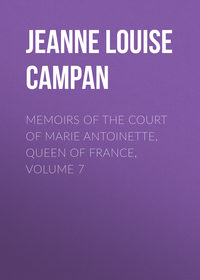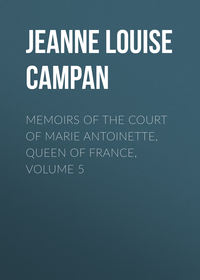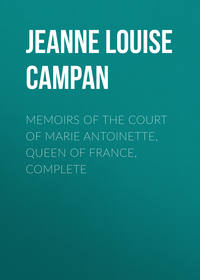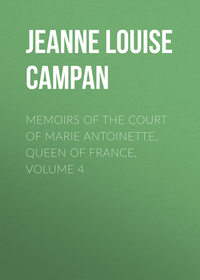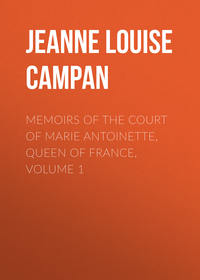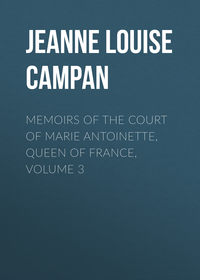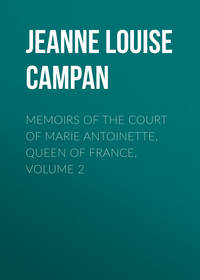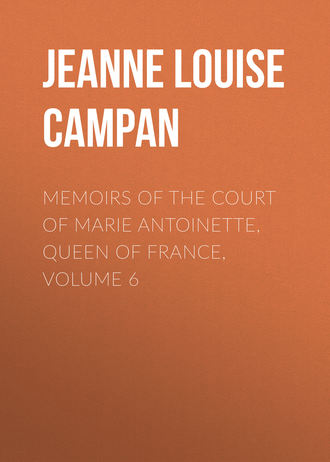 полная версия
полная версияMemoirs of the Court of Marie Antoinette, Queen of France, Volume 6
The police of M. de Laporte, intendant of the civil list, apprised him, as early as the latter end of 1791, that a man belonging to the King's offices who had set up as a pastrycook at the Palais Royal was about to resume the duties of his situation, which had devolved upon him again on the death of one who held it for life; that he was so furious a Jacobin that he had dared to say it would be a good thing for France if the King's days were shortened. His duty was confined to making the pastry; he was closely watched by the head officers of the kitchen, who were devoted to his Majesty; but it is so easy to introduce a subtle poison into made dishes that it was determined the King and Queen should eat only plain roast meat in future; that their bread should be brought to them by M. Thierry de Ville-d'Avray, intendant of the smaller apartments, and that he should likewise take upon himself to supply the wine. The King was fond of pastry; I was directed to order some, as if for myself, sometimes of one pastry-cook, and sometimes of another. The pounded sugar, too, was kept in my room. The King, the Queen, and Madame Elisabeth ate together, and nobody remained to wait on them. Each had a dumb waiter and a little bell to call the servants when they were wanted. M. Thierry used himself to bring me their Majesties' bread and wine, and I locked them up in a private cupboard in the King's closet on the ground floor. As soon as the King sat down to table I took in the pastry and bread. All was hidden under the table lest it might be necessary to have the servants in. The King thought it dangerous as well as distressing to show any apprehension of attempts against his person, or any mistrust of his officers of the kitchen. As he never drank a whole bottle of wine at his meals (the Princesses drank nothing but water), he filled up that out of which he had drunk about half from the bottle served up by the officers of his butlery. I took it away after dinner. Although he never ate any other pastry than that which I brought, he took care in the same manner that it should seem that he had eaten of that served at table. The lady who succeeded me found this duty all regulated, and she executed it in the same manner; the public never was in possession of these particulars, nor of the apprehensions which gave rise to them. At the end of three or four months the police of M. de Laporte gave notice that nothing more was to be dreaded from that sort of plot against the King's life; that the plan was entirely changed; and that all the blows now to be struck would be directed as much against the throne as against the person of the sovereign.
There are others besides myself who know that at this time one of the things about which the Queen most desired to be satisfied was the opinion of the famous Pitt. She would sometimes say to me, "I never pronounce the name of Pitt without feeling a chill like that of death." (I repeat here her very expressions.) "That man is the mortal enemy of France; and he takes a dreadful revenge for the impolitic support given by the Cabinet of Versailles to the American insurgents. He wishes by our destruction to guarantee the maritime power of his country forever against the efforts made by the King to improve his marine power and their happy results during the last war. He knows that it is not only the King's policy but his private inclination to be solicitous about his fleets, and that the most active step he has taken during his whole reign was to visit the port of Cherbourg. Pitt had served the cause of the French Revolution from the first disturbances; he will perhaps serve it until its annihilation. I will endeavour to learn to what point he intends to lead us, and I am sending M.– to London for that purpose. He has been intimately connected with Pitt, and they have often had political conversations respecting the French Government. I will get him to make him speak out, at least so far as such a man can speak out." Some time afterwards the Queen told me that her secret envoy was returned from London, and that all he had been able to wring from Pitt, whom he found alarmingly reserved, was that he would not suffer the French monarchy to perish; that to suffer the revolutionary spirit to erect an organised republic in France would be a great error, affecting the tranquillity of Europe. "Whenever," said she, "Pitt expressed himself upon the necessity of supporting monarchy in France, he maintained the most profound silence upon what concerns the monarch. The result of these conversations is anything but encouraging; but, even as to that monarchy which he wishes to save, will he have means and strength to save it if he suffers us to fall?"
The death of the Emperor Leopold took place on the 1st of March, 1792. When the news of this event reached the Tuileries, the Queen was gone out. Upon her return I put the letter containing it into her hands. She exclaimed that the Emperor had been poisoned; that she had remarked and preserved a newspaper, in which, in an article upon the sitting of the Jacobins, at the time when the Emperor Leopold declared for the coalition, it was said, speaking of him, that a pie-crust would settle that matter. At this period Barnave obtained the Queen's consent that he should read all the letters she should write. He was fearful of private correspondences that might hamper the plan marked out for her; he mistrusted her Majesty's sincerity on this point; and the diversity of counsels, and the necessity of yielding, on the one hand, to some of the views of the constitutionalists, and on the other, to those of the French Princes, and even of foreign Courts, were unfortunately the circumstances which most rapidly impelled the Court towards its ruin.
However, the emigrants showed great apprehensions of the consequences which might follow in the interior from a connection with the constitutionalists, whom they described as a party existing only in idea, and totally without means of repairing their errors. The Jacobins were preferred to them, because, said they, there would be no treaty to be made with any one at the moment of extricating the King and his family from the abyss in which they were plunged.
CHAPTER VII
In the beginning of the year 1792, a worthy priest requested a private interview with me. He had learned the existence of a new libel by Madame de Lamotte. He told me that the people who came from London to get it printed in Paris only desired gain, and that they were ready to deliver the manuscript to him for a thousand louis, if he could find any friend of the Queen disposed to make that sacrifice for her peace; that he had thought of me, and if her Majesty would give him the twenty-four thousand francs, he would hand the manuscript to me.
I communicated this proposal to the Queen, who rejected it, and desired me to answer that at the time when she had power to punish the hawkers of these libels she deemed them so atrocious and incredible that she despised them too much to stop them; that if she were imprudent and weak enough to buy a single one of them, the Jacobins might possibly discover the circumstance through their espionage; that were this libel brought up, it would be printed nevertheless, and would be much more dangerous when they apprised the public of the means she had used to suppress it.
Baron d'Aubier, gentleman-in-ordinary to the King, and my particular friend, had a good memory and a clear way of communicating the substance of the debates and decrees of the National Assembly. I went daily to the Queen's apartments to repeat all this to the King, who used to say, on seeing me, "Ah! here's the Postillon par Calais,"—a newspaper of the time.
M. d'Aubier one day said to me: "The Assembly has been much occupied with an information laid by the workmen of the Sevres manufactory. They brought to the President's office a bundle of pamphlets which they said were the life of Marie Antoinette. The director of the manufactory was ordered up to the bar, and declared he had received orders to burn the printed sheets in question in the furnaces used for baking his china."
While I was relating this business to the Queen the King coloured and held his head down over his plate. The Queen said to him, "Do you know anything about this, Sire?" The King made no answer. Madame Elisabeth requested him to explain what it meant. Louis was still silent. I withdrew hastily. A few minutes afterwards the Queen came to my room and informed me that the King, out of regard for her, had purchased the whole edition struck off from the manuscript which I had mentioned to her, and that M. de Laporte had not been able to devise any more secret way of destroying the work than that of having it burnt at Sevres, among two hundred workmen, one hundred and eighty of whom must, in all probability, be Jacobins! She told me she had concealed her vexation from the King; that he was in consternation, and that she could say nothing, since his good intentions and his affection for her had been the cause of the mistake.
[M. de Laporte had by order of the King bought up the whole edition of the "Memoirs" of the notorious Madame de Lamotte against the Queen. Instead of destroying them immediately, he shut them up in one of the closets in his house, The alarming and rapid growth of the rebellion, the arrogance of the crowd of brigands, who in great measure composed the populace of Paris, and the fresh excesses daily resulting from it, rendered the intendant of the civil list apprehensive that some mob might break into his house, carry off these "Memoirs," and spread them among the public. In order to prevent this he gave orders to have the "Memoirs" burnt with every necessary precaution; and the clerk who received the order entrusted the execution of it to a man named Riston, a dangerous Intriguer, formerly an advocate of Nancy, who had a twelve-month before escaped the gallows by favour of the new principles and the patriotism of the new tribunals, although convicted of forging the great seal, and fabricating decrees of the council. This Riston, finding himself entrusted with a commission which concerned her Majesty, and the mystery attending which bespoke something of importance, was less anxious to execute it faithfully than to make a parade of this mark of confidence. On the 30th of May, at ten in the morning, he had the sheets carried to the porcelain manufactory at Sevres, in a cart which he himself accompanied, and made a large fire of them before all the workmen, who were expressly forbidden to approach it. All these precautions, and the suspicions to which they gave rise, under such critical circumstances, gave so much publicity to this affair that it was denounced to the Assembly that very night. Brissot, and the whole Jacobin party, with equal effrontery and vehemence, insisted that the papers thus secretly burnt could be no other than the registers and documents of the correspondence of the Austrian committee. M. de Laporte was ordered to the bar, and there gave the most precise account of the circumstances. Riston was also called up, and confirmed M. de Laporte's deposition. But these explanations, however satisfactory, did not calm the violent ferment raised in the Assembly by this affair.—"Memoirs of Bertrand de Molleville."]
Some time afterwards the Assembly received a denunciation against M. de Montmorin. The ex-minister was accused of having neglected forty despatches from M. Genet, the charge d'affaires from France in Russia, not having even unsealed them, because M. Genet acted on constitutional principles. M. de Montmorin appeared at the bar to answer this accusation. Whatever distress I might feel in obeying the order I had received from the King to go and give him an account of the sitting, I thought I ought not to fail in doing so. But instead of giving my brother his family name, I merely said "your Majesty's charge d'affaires at St. Petersburg."
The King did me the favour to say that he noticed a reserve in my account, of which he approved. The Queen condescended to add a few obliging remarks to those of the King. However, my office of journalist gave me in this instance so much pain that I took an opportunity, when the King was expressing his satisfaction to me at the manner in which I gave him this daily account, to tell him that its merits belonged wholly to M. d'Aubier; and I ventured to request the King to suffer that excellent man to give him an account of the sittings himself. I assured the King that if he would permit it, that gentleman might proceed to the Queen's apartments through mine unseen; the King consented to the arrangement. Thenceforward M. d'Aubier gave the King repeated proofs of zeal and attachment.
The Cure of St. Eustache ceased to be the Queen's confessor when he took the constitutional oath. I do not remember the name of the ecclesiastic who succeeded him; I only know that he was conducted into her apartments with the greatest mystery. Their Majesties did not perform their Easter devotions in public, because they could neither declare for the constitutional clergy, nor act so as to show that they were against them.
The Queen did perform her Easter devotions in 1792; but she went to the chapel attended only by myself. She desired me beforehand to request one of my relations, who was her chaplain, to celebrate a mass for her at five o'clock in the morning. It was still dark; she gave me her arm, and I lighted her with a taper. I left her alone at the chapel door. She did not return to her room until the dawn of day.
Dangers increased daily. The Assembly were strengthened in the eyes of the people by the hostilities of the foreign armies and the army of the Princes. The communication with the latter party became more active; the Queen wrote almost every day. M. de Goguelat possessed her confidence for all correspondence with the foreign parties, and I was obliged to have him in my apartments; the Queen asked for him very frequently, and at times which she could not previously appoint.
All parties were exerting themselves either to ruin or to save the King. One day I found the Queen extremely agitated; she told me she no longer knew where she was; that the leaders of the Jacobins offered themselves to her through the medium of Dumouriez; or that Dumouriez, abandoning the Jacobins, had come and offered himself to her; that she had granted him an audience; that when alone with her, he had thrown himself at her feet, and told her that he had drawn the 'bonnet rouge' over his head to the very ears; but that he neither was nor could be a Jacobin; that the Revolution had been suffered to extend even to that rabble of destroyers who, thinking of nothing but pillage, were ripe for anything, and might furnish the Assembly with a formidable army, ready to undermine the remains of a throne already but too much shaken. Whilst speaking with the utmost ardour he seized the Queen's hand and kissed it with transport, exclaiming, "Suffer yourself to be saved!" The Queen told me that the protestations of a traitor were not to be relied on; that the whole of his conduct was so well known that undoubtedly the wisest course was not to trust to it;
[The sincerity of General Dumouriez cannot be doubted in this instance. The second volume of his Memoirs shows how unjust the mistrust and reproaches of the Queen were. By rejecting his services, Marie Antoinette deprived herself of her only remaining support. He who saved France in the defiles of Argonne would perhaps have saved France before the 20th of June, had he obtained the full confidence of Louis XVI. and the Queen.—NOTE BY THE EDITOR.]
that, moreover, the Princes particularly recommended that no confidence should be placed in any proposition emanating from within the kingdom; that the force without became imposing; and that it was better to rely upon their success, and upon the protection due from Heaven to a sovereign so virtuous as Louis XVI. and to so just a cause.
The constitutionalists, on their part, saw that there had been nothing more than a pretence of listening to them. Barnave's last advice was as to the means of continuing, a few weeks longer, the Constitutional Guard, which had been denounced to the Assembly, and was to be disbanded. The denunciation against the Constitutional Guard affected only its staff, and the Duc de Brissac. Barnave wrote to the Queen that the staff of the guard was already attacked; that the Assembly was about to pass a decree to reduce it; and he entreated her to prevail on the King, the very instant the decree should appear, to form the staff afresh of persons whose names he sent her. Barnave said that all who were set down in it passed for decided Jacobins, but were not so in fact; that they, as well as himself, were in despair at seeing the monarchical government attacked; that they had learnt to dissemble their sentiments, and that it would be at least a fortnight before the Assembly could know them well, and certainly before it could succeed in making them unpopular; that it would be necessary to take advantage of that short space of time to get away from Paris, immediately after their nomination. The Queen was of opinion that she ought not to yield to this advice. The Duc de Brissac was sent to Orleans, and the guard was disbanded.
Barnave, seeing that the Queen did not follow his counsel in anything, and convinced that she placed all her reliance on assistance from abroad, determined to quit Paris. He obtained a last audience. "Your misfortunes, Madame," said he, "and those which I anticipate for France, determined me to sacrifice myself to serve you. I see, however, that my advice does not agree with the views of your Majesties. I augur but little advantage from the plan you are induced to pursue,—you are too remote from your succours; you will be lost before they reach you. Most ardently do I wish I may be mistaken in so lamentable a prediction; but I am sure to pay with my head for the interest your misfortunes have raised in me, and the services I have sought to render you. I request, for my sole reward, the honour of kissing your hand." The Queen, her eyes suffused with tears, granted him that favour, and remained impressed with a favourable idea of his sentiments. Madame Elisabeth participated in this opinion, and the two Princesses frequently spoke of Barnave. The Queen also received M. Duport several times, but with less mystery. Her connection with the constitutional deputies transpired. Alexandre de Lameth was the only one of the three who survived the vengeance of the Jacobins.
[Barnave was arrested at Grenoble. He remained in prison in that town fifteen months, and his friends began to hope that he would be forgotten, when an order arrived that he should be removed to Paris. At first he was imprisoned in the Abbaye, but transferred to the Conciergerie, and almost immediately taken before the revolutionary tribunal. He appeared there with wonderful firmness, summed up the services he had rendered to the cause of liberty with his usual eloquence, and made such an impression upon the numerous auditors that, although accustomed to behold only conspirators worthy of death in all those who appeared before the tribunal, they themselves considered his acquittal certain. The decree of death was read amidst the deepest silence; but Barnave'a firmness was immovable. When he left the court, he cast upon the judges, the jurors, and the public looks expressive of contempt and indignation. He was led to his fate with the respected Duport du Tertre, one of the last ministers of Louis XVI. when he had ascended the scaffold, Barnave stamped, raised his eyes to heaven, and said: "This, then, is the reward of all that I have done for liberty!" He fell on the 29th of October, 1793, in the thirty-second year of his age; his bust was placed in the Grenoble Museum. The Consular Government placed his statue next to that of Vergniaud, on the great staircase of the palace of the Senate.—"Biographie de Bruxelles."]
The National Guard, which succeeded the King's Guard, having occupied the gates of the Tuileries, all who came to see the Queen were insulted with impunity. Menacing cries were uttered aloud even in the Tuileries; they called for the destruction of the throne, and the murder of the sovereign; the grossest insults were offered by the very lowest of the mob.
About this time the King fell into a despondent state, which amounted almost to physical helplessness. He passed ten successive days without uttering a single word, even in the bosom of his family; except, indeed, when playing at backgammon after dinner with Madame Elisabeth. The Queen roused him from this state, so fatal at a critical period, by throwing herself at his feet, urging every alarming idea, and employing every affectionate expression. She represented also what he owed to his family; and told him that if they were doomed to fall they ought to fall honourably, and not wait to be smothered upon the floor of their apartment.
About the 15th of June, 1792, the King refused his sanction to the two decrees ordaining the deportation of priests and the formation of a camp of twenty thousand men under the walls of Paris. He himself wished to sanction them, and said that the general insurrection only waited for a pretence to burst forth. The Queen insisted upon the veto, and reproached herself bitterly when this last act of the constitutional authority had occasioned the day of the 20th of June.
A few days previously about twenty thousand men had gone to the Commune to announce that, on the 20th, they would plant the tree of liberty at the door of the National Assembly, and present a petition to the King respecting the veto which he had placed upon the decree for the deportation of the priests. This dreadful army crossed the garden of the Tuileries, and marched under the Queen's windows; it consisted of people who called themselves the citizens of the Faubourgs St. Antoine and St. Marceau. Clothed in filthy rags, they bore a most terrifying appearance, and even infected the air. People asked each other where such an army could come from; nothing so disgusting had ever before appeared in Paris.
On the 20th of June this mob thronged about the Tuileries in still greater numbers, armed with pikes, hatchets, and murderous instruments of all kinds, decorated with ribbons of the national colours, Shouting, "The nation for ever! Down with the veto!" The King was without guards. Some of these desperadoes rushed up to his apartment; the door was about to be forced in, when the King commanded that it should be opened. Messieurs de Bougainville, d'Hervilly, de Parois, d'Aubier, Acloque, Gentil, and other courageous men who were in the apartment of M. de Septeuil, the King's first valet de chambre, instantly ran to his Majesty's apartment. M. de Bougainville, seeing the torrent furiously advancing, cried out, "Put the King in the recess of the window, and place benches before him." Six royalist grenadiers of the battalion of the Filles Saint Thomas made their way by an inner staircase, and ranged themselves before the benches. The order given by M. de Bougainville saved the King from the blades of the assassins, among whom was a Pole named Lazousky, who was to strike the first blow. The King's brave defenders said, "Sire, fear nothing." The King's reply is well known: "Put your hand upon my heart, and you will perceive whether I am afraid." M. Vanot, commandant of battalion, warded off a blow aimed by a wretch against the King; a grenadier of the Filles Saint Thomas parried a sword-thrust made in the same direction. Madame Elisabeth ran to her brother's apartments; when she reached the door she heard loud threats of death against the Queen: they called for the head of the Austrian. "Ah! let them think I am the Queen," she said to those around her, "that she may have time to escape."
The Queen could not join the King; she was in the council chamber, where she had been placed behind the great table to protect her, as much as possible, against the approach of the barbarians. Preserving a noble and becoming demeanour in this dreadful situation, she held the Dauphin before her, seated upon the table. Madame was at her side; the Princesse de Lamballe, the Princesse de Tarente, Madame de la Roche-Aymon, Madame de Tourzel, and Madame de Mackau surrounded her. She had fixed a tricoloured cockade, which one of the National Guard had given her, upon her head. The poor little Dauphin was, like the King, shrouded in an enormous red cap. The horde passed in files before the table;
[One of the circumstances of the 20th of June which most vexed the King's friends being that of his wearing the bonnet rouge nearly three hours, I ventured to ask him for some explanation of a fact so strikingly in contrast with the extraordinary intrepidity shown by his Majesty during that horrible day. This was his answer: "The cries of 'The nation for ever!' violently increasing around me, and seeming to be addressed to me, I replied that the nation had not a warmer friend than myself. Upon this an ill-looking man, making his way through the crowd, came up to me and said, rather roughly, 'Well, if you speak the truth, prove it by putting on this red cap.' 'I consent,' replied I. One or two of them immediately came forward and placed the cap upon my hair, for it was too small for my head. I was convinced, I knew not why, that his intention was merely to place the cap upon my head for a moment, and then to take it off again; and I was so completely taken up with what was passing before me that I did not feel whether the cap did or did not remain upon my hair. I was so little aware of it that when I returned to my room I knew only from being told so that it was still there. I was very much surprised to find it upon my head, and was the more vexed at it because I might have taken it off immediately without the smallest difficulty. But I am satisfied that if I had hesitated to consent to its being placed upon my head the drunken fellow who offered it to me would have thrust his pike into my stomach."—"Memoirs of Bertrand de Molleville."]


